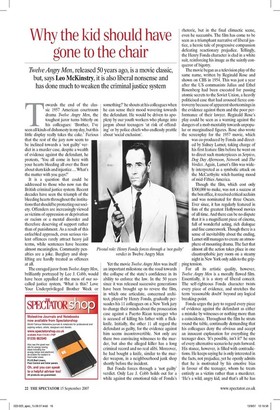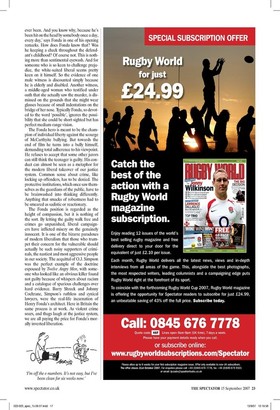Why the kid should have gone to the chair
Twelve Angiy Men, released 50 years ago, is a movie classic, but, says Leo McKinstry, it is also liberal nonsense and has done much to weaken the criminal justice system Towards the end of the classic 1957 American courtroom drama Twelve Angry Men, the toughest juror turns bitterly on his colleagues: 'Brother, I've seen all kinds of dishonesty in my day, but this little display really takes the cake.' Furious that the rest of the jury now seem to be inclined towards a 'not guilty' verdict in a murder case, despite a wealth of evidence against the defendant, he protests, 'You all come in here with your hearts bleeding all over the floor about slum kids and injustice ...What's the matter with you guys?'
It is a question that could be addressed to those who now run the British criminal justice system. Recent decades have seen the triumph of the bleeding hearts throughout the institutions that should be protecting our society. Offenders are increasingly viewed as victims of oppression or deprivation or racism or a mental disorder and therefore deserving of support rather than of punishment. As a result of this enfeebled approach, even serious violent offences rarely attract heavy jail terms, while sentences have become almost meaningless. Community penalties are a joke. Burglary and shoplifting are hardly treated as offences at all.
The enraged juror from Twelve Angry Men, brilliantly portrayed by Lee J. Cobb, would have been appalled at the mess of our socalled justice system, 'What is this? Love Your Underprivileged Brother Week or something?' he shouts at his colleagues when he can sense their mood wavering towards the defendant. He would be driven to apoplexy by our youth workers who plunge into jargon about teenagers 'at risk of offending' or by police chiefs who endlessly prattle about 'social exclusion'.
Yet the movie Twelve Angry Men was itself an important milestone on the road towards the collapse of the state's confidence in its ability to enforce the law. In the 50 years since it was released successive generations have been brought up to revere the film, in which one articulate, concerned architect, played by Henry Fonda, gradually persuades his 11 colleagues on a New York jury to change their minds about the prosecution case against a Puerto Rican teenager who is accused of killing his father with a flickknife. Initially, the other 11 all regard the defendant as guilty, for the evidence against him seems incontrovertible. Not only are there two convincing witnesses to the murder, but also the alleged killer has a long criminal record and no real alibi. Moreover, he had bought a knife, similar to the murder weapon, in a neighbourhood junk shop shortly before the incident.
But Fonda forces through a 'not guilty' verdict. Only Lee J. Cobb holds out for a while against the emotional tide of Fonda's rhetoric, but in the final climactic scene, even he succumbs. The film has come to be seen as a triumphant narrative of liberal justice, a heroic tale of progressive compassion defeating reactionary prejudice. Tellingly, the Henry Fonda character is clad in a white suit, reinforcing his image as the saintly conqueror of bigotry.
The movie began as a television play of the same name, written by Reginald Rose and shown on CBS in 1954. This was just a year after the US communists Julius and Ethel Rosenberg had been executed for passing atomic secrets to the Soviet Union, a heavily politicised case that had aroused fierce controversy because of apparent shortcomings in the evidence against them and the poor performance of their lawyer. Reginald Rose's play could be seen as a warning against the dangers of a mob mentality towards unpopular or marginalised figures. Rose also wrote the screenplay for the 1957 movie, which was co-produced by Fonda and directed by Sidney Lumet, taking charge of his first feature film before he went on to direct such masterpieces as Serpico, Dog Day Afternoon, Network and The Verdict. Again, Lumet's film was widely interpreted as a symbolic attack on the McCarthyite witch-hunting mood of mid-Fifties America.
Though the film, which cost only $300,000 to make, was not a success at the box office, it received critical acclaim and was nominated for three Oscars. Ever since, it has regularly featured in lists of the greatest Hollywood movies of all time. And there can be no dispute that it is a magnificent piece of cinema, full of wonderful acting, rich dialogue and fine camerawork. Though there is a sense of inevitability about the ending, Lumet still manages to create an atmosphere of mounting drama. The fact that almost all the action takes place in one claustrophobic jury room on a steamy night in New York only adds to the gripping tension.
For all its artistic quality, however, Twelve Angry Men is a morally flawed film Essentially, it is a story of liberal conceit. The self-righteous Fonda character twists every piece of evidence, and stretches the term 'reasonable doubt' beyond any logical breaking-point.
Fonda urges the jury to regard every piece of evidence against the defendant as either a mistake by witnesses or nothing more than a coincidence. Throughout the film he struts round the table, continually demanding that his colleagues deny the obvious and accept an innocent explanation for everything the teenager does. 'It's possible, isn't it?' he says of every alternative scenario he puts forward. His stance, however, is filled with contradictions. He keeps saying he is only interested in the facts, not prejudice, yet he openly admits that he is motivated by his emotive bias in favour of the teenager, whom he treats entirely as a victim rather than a murderer. 'He's a wild, angry kid, and that's all he has ever been. And you know why, because he's been hit on the head by somebody once a day, every day,' says Fonda in one of his opening remarks. How does Fonda know that? Was he keeping a check throughout the defendant's childhood? Of course not. This is nothing more than sentimental eyewash. And for someone who is so keen to challenge prejudice, the white-suited liberal seems pretty keen on it himself. So the evidence of one male witness is discounted simply because he is elderly and disabled. Another witness, a middle-aged woman who testified under oath that she actually saw the murder, is dismissed on the grounds that she might wear glasses because of small indentations on the bridge of her nose. Typically Fonda, so devoted to the word 'possible', ignores the possibility that she could be short-sighted but has perfect medium-range vision.
The Fonda hero is meant to be the champion of individual liberty against the scourge of McCarthyite bullying. But towards the end of film he turns into a bully himself, demanding total adherence to his viewpoint. He refuses to accept that some other jurors can still think the teenager is guilty. His conduct can almost be seen as a metaphor for the modern liberal takeover of our justice system. Common sense about crime, like locking up offenders, has to be denied. The protective institutions, which once saw themselves as the guardians of the public, have to be brainwashed into thinking differently. Anything that smacks of robustness had to be smeared as sadistic or reactionary.
The Fonda position is regarded as the height of compassion, but it is nothing of the sort. By letting the guilty walk free and crimes go unpunished, liberal campaigners have inflicted misery on the genuinely innocent. It is one of the bizarre paradoxes of modern liberalism that those who trumpet their concern for the vulnerable should actually be such noisy supporters of criminals, the nastiest and most aggressive people in our society. The acquittal of O.J. Simpson was the perfect example of the doctrine espoused by Twelve Angry Men, with someone who looked like an obvious killer found not guilty because of whispers about racism and a catalogue of spurious challenges over hard evidence. Barry Shreck and Johnny Cochrane, Simpson's ruthless and cynical lawyers, were the real-life incarnation of Henry Fonda's architect. Here in Britain the same process is at work. As violent crime soars, and thugs laugh at the justice system, we are all paying the price for Fonda's morally inverted liberation.


























































 Previous page
Previous page